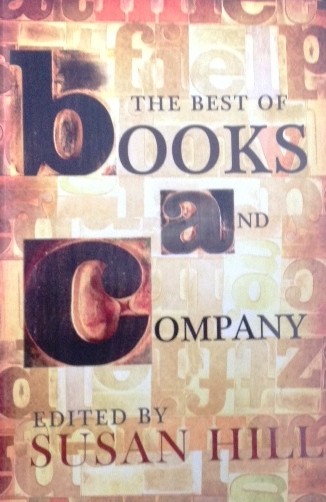Inspiring Older Readers
 posted on 16 Jun 2022
posted on 16 Jun 2022
The Best of Books and Company edited by Susan Hill
I'm not much of a fan of Susan Hill as a novelist but it can't be denied that she has a lengthy pedigree when it comes to a love of books and dabbling in publishing. In the late 1990s she established Long Barn Books, the origins of which she describes in this way:
“I started the imprint with the small paperback of Listening to the Orchestra and Other Stories which sold almost 12,000 copies. I was not planning to publish my own books in general. Self-publishing had quite a stigma back then and I had a very good traditional publisher. But I was having fun so I started to look around for books by other people.”
But, of course, being a publisher is very greedy when it comes to eating up time and resources so Hill found it necessary to put Long Barn Books on the back-burner in order to focus on her own writing. But by 2015, she was back:
“I had rather neglected my own writing for publishing so I let Long Barn Books take a back seat for a few years while I caught up. Now I`m back with some of my own back-list titles brought into print again, plus books by others.”
One of her publishing projects that did survive was her own literary magazine, Books and Company. In her forward to this selection from the pages of that magazine, Hill tells us:
“The main reason for its abrupt cessation…was not any change of heart on my part but a fire in the barn where my office was, which destroyed the entire working database and mailing list.”
The task of recreating that database was too onerous and so the magazine was no more – popular though it was. Much of this popularity came from the extraordinarily high quality of the contributors and their submissions – most of which focussed on the love of books, the value of reading, book reviews and literary criticism.
In this anthology are contributions from Jeanette Winterson, Penelope Fitzgerald, William Trevor, Philip Hensher, Roger Scruton and many more big names of the modern literary firmament. The articles very broadly fall into two halves – the first half of the book being mainly dedicated to the love of books, reading and book ownership, while the second half tends to focus on a writer’s appreciation of specific books or authors. Given my own interests, it was the essays in the first part of the book that gave me most pleasure.
I especially identified with Penelope Lively’s ‘De-accessioning’ – a title for her contribution she has adopted from the library practice of removing unwanted books from their shelves. Lively describes the terrible task of deciding which books she no longer needs to retain in her personal library and the rules she makes up for herself before completely disregarding them when confronted with the reality of ‘de-accessioning’ them.
I liked Jeanette Winterson’s opening essay ‘A roof of one’s own’ that sets out how she covertly explored the world of reading despite the censorious efforts of her religiously austere mother and I was surprised to find Roger Scruton’s ‘How I discovered books’ remarkably congenial. Scruton’s political views are like Kryptonite to me but his book journey is full of familiar pathways.
The one thing that binds this anthology together is the undeniable quality of the contributions whatever direction they come from. It’s a ‘dip-into’ sort of book if you don’t relish the chopping and changing of writing styles but it’s also a book you can read from cover to cover and find yourself transported and, importantly, re-energised when it comes to discovering yet again just why you love books and reading.
Only available in card-cover, the book can be easily found on most bookselling websites for well under £10.
Terry Potter
June 2022